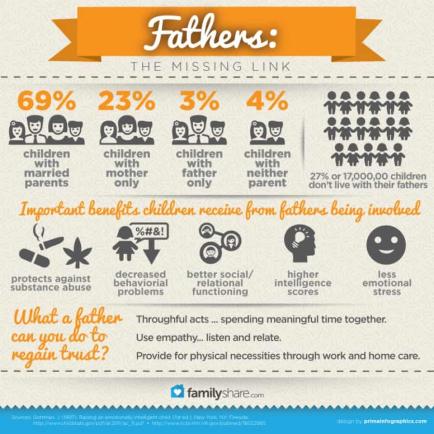
The Federal Interagency Forum on Child and Family Statistics reported that in 2010 approximately 69 percent of children, from age 0-17, lived with both parents while twenty-three percent of children live with their mothers only. Three percent lived with their father only while four percent lived with neither parent. Thinking of these statistics in another light, there are twenty-seven percent of American children who do not live with their father or seventeen million.
Fathers AND mothers both play an invaluable role in the development of children, but that is the problem: fathers are significantly less involved than mothers. Fathers play an integral part in the life development of children and this has been well documented by family scientists. A review of research studies conducted around the country has revealed important benefits children receive from fathers being involved (this is not a complete list, but some important findings):
-
Protection against substance use
-
Decreased behavioral problems in adolescence
-
Better social/relational functioning
-
Less aggressive behavior
-
Higher intelligence scores
-
Less emotional distress in young adulthood
Unfortunately, not all fathers can be involved with their children. Some fathers may be incarcerated or separated from the family through death, but there are fathers that can protect their children by getting involved.
Perhaps even worse (although a different discussion) are those fathers who are physically present but emotionally unavailable. Fathers who may have lost their children's trust by being uninvolved or critical can begin to repair their relationships through small steps.
-
First, if you have adolescent children it may be necessary to regain trust through thoughtful acts or an apology. Otherwise, begin to establish a time when you can do a meaningful activity together. This could be reading, singing, playing in the sandbox. Fathers who play with their young children are teaching important social cues. You can't connect with your child if you don't make time to be together.
-
Second, use empathy. When adolescents come with personal challenges, acknowledge their feelings without trying to solve the problem. Listening and relating the story back in different words to let them know they have been heard are all part of being empathetic. With young children it is much the same process they need to be heard (contrary to popular belief). If children feel understood they will be more likely to listen in-turn. Refer to John Gottman's book Raising an Emotionally Intelligent Child to understand more about showing empathy.
-
A third practice that fathers can implement to be more involved is to provide for the physical necessities of children through work and home care. Fathers who are actively engaged in providing for the needs of their children will have more stable homes. Fathers who provide are more likely to spend more time with their children. These three things are not revolutionary ideas, but they can change lives, especially the lives of your children. Most importantly, be emotionally available, be emotionally and physically present. Children need your social resources as much or arguably more than monetary assistance.
Sources:
-
Gottman, J. (1997). Raising an emotionally intelligent child. (1st ed.). New York, NY: Fireside.
-
[http://www.childstats.gov/pdf/ac2011/ac11.pdf](http://www.childstats.gov/pdf/ac2011/ac11.pdf)
- em,http://www.ncbi.nlm.nih.gov/pubmed/18052995

